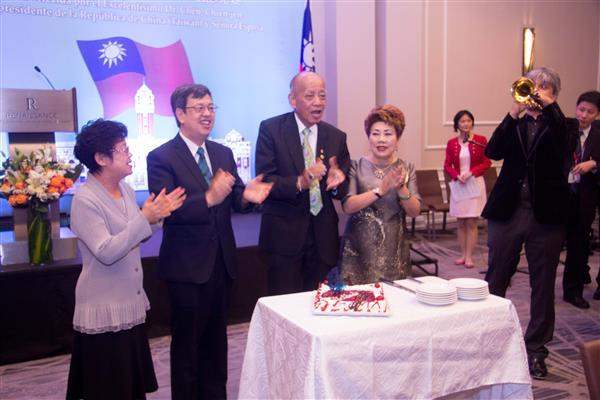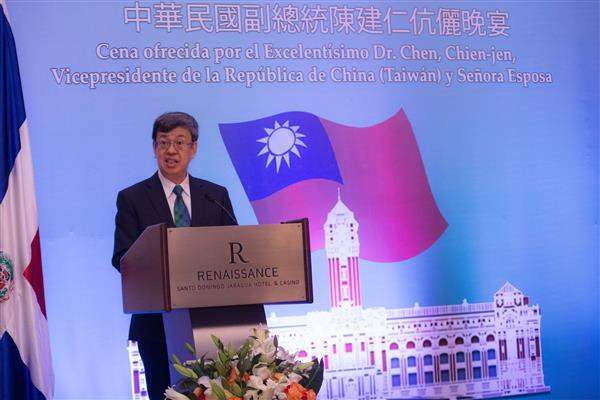News & activities
 News releases
News releases
On the evening of August 14 (morning of August 15, Taipei time), Vice President Chen Chien-jen hosted a banquet for representatives of the Taiwanese expatriate community in the Dominican Republic.
In remarks, the vice president first thanked the expatriates and their children for warmly welcoming him at his hotel, and noted that during their long years overseas, expatriates have demonstrated the wisdom and respectful spirit of their native culture, each year holding celebrations to mark the Chinese New Year, the Dragon Boat Festival, the Mid-Autumn Festival, and other such events. In addition to building ties of friendship within the expatriate community, such undertakings also integrate traditional Taiwanese folk customs into mainstream society in countries throughout the world. Through our expatriates, he said, foreign friends come to appreciate the beauty of Chinese culture. In these ways, expatriates make a great contribution to bilateral friendship.
The vice president also thanked the expatriate community in the Dominican Republic for supporting the Republic of China government, and for working so hard over many years to contribute to the Dominican Republic. Through all this the world has come to see the enterprising spirit of the Taiwanese people.
Commenting on relations between Taiwan and the Dominican Republic, the vice president said that official diplomatic ties between these two countries, which are separated by the vast Pacific Ocean, date back over seven decades to 1941. The bilateral friendship is rich indeed, just like the flavor of Dominican coffee and Taiwan's oolong tea, he remarked.
The vice president pointed out that President Medina directed Vice President Andres Navarro Garcia to lead a delegation to take part in the inauguration of Taiwan's president and vice president on May 20 this year, and that now three months later he was acting as President Tsai Ing-wen's representative in heading a delegation to attend President Medina's own inauguration. Hopefully, he said, this trip will boost mutual understanding and interaction between the governments and peoples of the two countries, and will further enhance the full range of bilateral cooperative relations.
The vice president stated that there have been too many successful instances of bilateral cooperation to enumerate in full, but the contributions of Dr. Yin-Tieh Hsieh (謝英鐸), who is known as "the father of rice in the Dominican Republic," are particularly noteworthy. Dispatched to the Taiwan Agricultural Technical Mission in the Dominican Republic in 1965, Dr. Hsieh helped the Dominican Republic develop improved rice strains, taught local farmers how to raise whiteleg shrimp, tilapia, and bamboo, and established the Dominican Republic's first center for bamboo and handicrafts.
Noting that President Medina often takes advantage of weekends to tour the countryside in what he calls "surprise visits" (visitas sorpresas), Vice President Chen mentioned that President Medina once stopped in on a bamboo production and marketing organization operating under the direction of the Taiwan Agricultural Technical Mission. The president was very impressed by the excellent results achieved by Taiwan's assistance to the Dominican Republic bamboo industry, and put in a request for Taiwan to help expand bamboo output in his country.
Another story that really moved him, said the vice president, is the establishment of the Tzu Chi La Romana School. La Romana is a popular tourist destination located two hours away from the capital of Santo Domingo, but back in 1998 there was a big garbage dump nearby. Lots of illegal immigrants from Haiti lived near the dump and subsisted on the garbage.
Then people from the Tzu Chi Foundation arrived in the Dominican Republic to help with hurricane relief, saw children wandering around in the streets, and came up with a plan to build an elementary school. Completed in 2000, the school only had six classrooms in the beginning. Later the government of the Dominican Republic removed the garbage dump and made plans for a residential district that attracted large numbers of people to move into the area. Tzu Chi responded by building eight more classrooms for the school, where more than 1,400 children are now enrolled. Those children are keenly aware of the love and compassion of the Taiwanese toward the people of the Dominican Republic.
The vice president stressed that these real-life stories depict exactly the kind of "mutual assistance for mutual benefits" that Taiwan is pursuing, step by step with unwavering focus. And this is precisely what "steadfast diplomacy", of which President Tsai frequently speaks, is all about. At the same time, such stories prove that Taiwan has the ability to work with all countries to play a more important role in the international community, and to make bigger contributions.
And finally, the vice president stated that the ROC government and embassy will continue to make every possible effort to provide overseas expatriates with needed services and assistance. He also expressed his sincere hope that the expatriate community representatives attending the banquet will stand with the government on the front lines of diplomacy, and use their influence to further enhance bilateral relations.
In his capacity as host of the evening's banquet, the vice president presented a birthday cake to wish a happy birthday for Overseas Community Affairs Council Senior Adviser Lu Wei-ming (呂偉銘), who was at the banquet. The vice president's wife also revealed that she and her husband were celebrating their 39th wedding anniversary that day. Accompanied by a band, everyone sang happy birthday in an atmosphere of great revelry.










